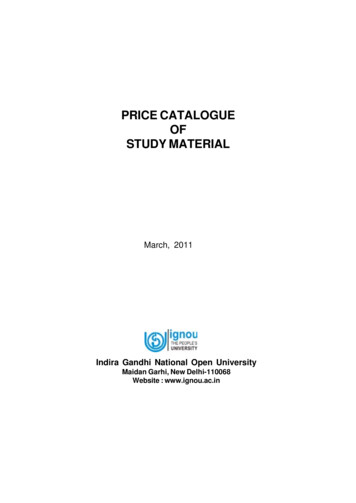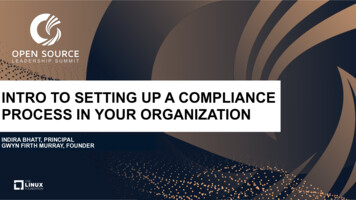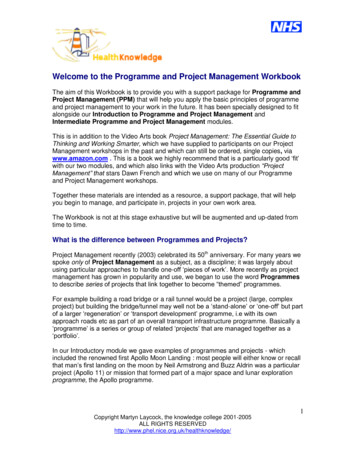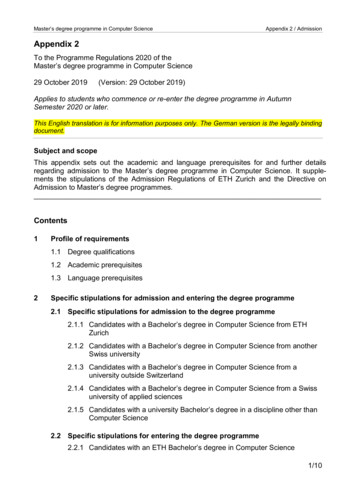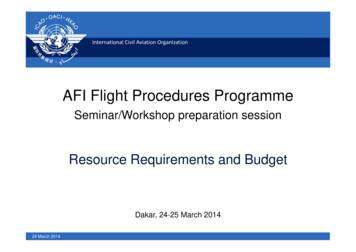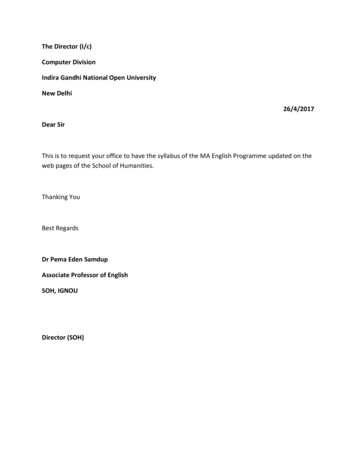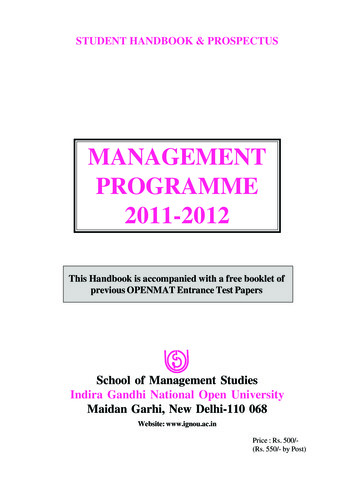
Transcription
STUDENT HANDBOOK & PROSPECTUSMANAGEMENTPROGRAMME2011-2012This Handbook is accompanied with a free booklet ofprevious OPENMAT Entrance Test PapersSchool of Management StudiesIndira Gandhi National Open UniversityMaidan Garhi, New Delhi-110 068Website: www.ignou.ac.inPrice : Rs. 500/(Rs. 550/- by Post)
RECOGNITIONvf[ky Hkkjrh; rduhdh f'k{kk ifj"kn ALL INDIA COUNCIL FOR TECHNICAL EDUCATION¼Hkkjr ljdkj dk ,d lkafof/kd laLFkku½(A STATUTORY BODY OF THE GOVERNMENT OF INDIA)DR. NAGIN CHANDADVISOR (PC/ACADEMIC)F.No. AICTE/Academic/MOU-DEC/2005May 13, 2005ToThe Secretaries/DirectorsTechnical EducationAll State Governments/Union TerritoriesSubject: Recognition of MBA, MCA programmes awarded byIndira Gandhi National Open University, (IGNOU) New Delhi.IGNOU, New Delhi has been established by sub-section (2) of section (1) ofthe IGNOU Act, 1985 (50 of 1985) vide Notification No. F.13-12/85-Desk(U)dated September 19, 1985 issued by the Department of Education, Ministryof HRD, Government of India, New Delhi.I am directed to say that the Master of Business Administration (MBA)and Master of Computer Applications (MCA) degrees awarded by IGNOUare recognized by AICTE.Your faithfully,–Sd.–(Nagin Chand)Copy to:All Regional Officers, AICTE.bafnjk xka/kh [ksy ifjlj] bUnzizLFk ,LVsV] ubZ fnYyh&110 002Indira Gandhi Sports Complex, I.P. Estate, New Delhi-110 002nwjHkk"k@ Phone: 23392506, 63-65,68,71,73-75 QSDl@ Fax: 011&23392554IGNOU is a CENTRAL UNIVERSITY established by an Act of Parliament in 1985 (Act No. 50of 1985). IGNOU Degrees/Diplomas/Certificates are recognised by all the members of theAssociation of Indian Universities (AIU) and at par with Degrees/Diplomas/Certificates ofall Indian Universities/Deemed Universities/Institutions vide UGC Circular No. F. 1-8/92 (CPP)dated February 1992 & AIU Circular No. EV/B (449)/94/176915-177115 dated January 1994.
CONTENTSPage Nos. The University . 6 The Schools of Studies . 6 Academic Programmes . 6 Course Material . 7 Credit System . 7 Student Support Services . 7 Delivery Systems . 8 Gyan Darshan and Gyan Vani Educational Channels . 9 Management Programme . 9 Programme Structure . 11 Eligibility for Admission to Management Programmes . 13 Admission to MBA from DIM and PGSDM . 13 Entrance Test (OPENMAT-XXIX, XXX and XXXI) . 13 Admission . 14 Validity of OPENMAT Score . 14 Incomplete and Late Applications . 14 Re-Registration / Re-Admission . 14 Certificate of Completion . 16 Reservation . 16 Fee Structure . 16 Scholarships and Reimbursement of Fees . 16 Change of Region by Students . 16 Change / Correction of Address and Study Centre . 16 Evaluation . 17 Exemption Scheme . 18 Migration Certificate . 18 Credit Transfer Scheme . 18 Schedule of Operations . 19 Faculty of Management Studies . 20
CONTENTS — contd. Appendix - 1 : Names and Codes of Programmes, Eligibility and Fees . 21 Appendix - 2 : Region-wise List of Study Centres . 22 Appendix - 3 : Addresses and Codes of IGNOU Regional Centres . 62 Appendix - 4 : List of State Codes . 74 Appendix - 5 : Codes for Qualification, Sex, Category, Territory, Marital Status,Social Status and Employment Status . 75 Appendix - 6 : Modalities of Submission of Assignments and Term-End Examination . 76 Appendix - 7 : Internal Credit Transfer Scheme for Fresh Admission to Management Programme(Applicable after expiry of maximum duration) . 81 Application form for Fresh Admission to Management Programme in order to completeleft over courses (Form 3) . 83 Application form for Internal Credit Transfer in Management Programme for thosewho have sought Fresh Admission (Appendix 7–Proforma) . 87 Appendix - 8 : Course Components of Management Programme . 89 Instructions for Filling the Application Form for the Entrance Test (Openmat Form-1) . 138 Instructions for filling the Application Form for admission to Management Programme (Form-2) . 139 Form No. 2. Application Form for admission to Management Programme . 141 Experience Certificate and Category Certificate . 143 Guidelines for Project Course (MS-100) . 144 Proforma for Approval of Project Proposal (MS-100) . 148 Appendix-9Re-Registration / Re-Admission Form . 149Requisition for Fresh Set of Assignments . 151Term-End Examination Form . 153Application Form for Re-evaluation of Answer Script . 155Application Form for Obtaining Photocopy of the Answer Script . 157Application Form for Early Declaration of Result of Term-End Examination . 159Application Form for Obtaining Duplicate Grade Card / Mark-sheet . 161Application for Non-Receipt of Study Material / Assignment . 162Application Form for issue of Migration Certificate . 163Application Form for Issue of Official Transcript . 165Application for Change / Correction of Address / Study Centre . 166Application Form for Improvement in Division/Class . 167 Appendix-10: List of designated branches of Indian Bank and IDBI Bank forIGNOU Fee collection for admission puspose . .169 IDENTITY CARD ACKNOWLEDGEMENT CARD4
PROGRAMMES ON OFFER MBA PGDIMDIM PGDHRM PGDFM PGDOM PGDMM Student Handbook & Prospectus would be available at all Regional Centres, Study Centres, and IGNOUARMY, NAVY AND ASSAM RIFLES Recognised Regional Centres.Student Handbook and Prospectus is also available on university’s website www.ignou.ac.in. The candidatesdownloading the Form from website are required to send a Demand Draft of Rs. 550/- (Rupees five hundredfifty only) drawn in favour of IGNOU payable at New Delhi.Schedule of activities for Openmat-XXIX, XXX and XXXI Entrance TestDate of EntranceTestLast date ofsubmissionof the entrancetest form(Form 1) atUniversityHeadquartersEligible to take admission in(validity of openmat score)Last date forsubmission ofapplication form foradmission at theconcerned RegionalCentre alongwithResult Card, IdentityCard and otherrelevant documents06.02.2011(Openmat-XXIX)15.12.20102nd Sem., 2011 (July, 2011)Ist Sem., 2012 (January, 2012)31st May, 201130th November, 201121.08.2011(Openmat-XXX)15.07.2011Ist Sem., 2012 (January, 2012)2nd Sem., 2012 (July, 2012)30th November, 201131st May, 201205.02.2012(Openmat-XXXI)15.12.20112nd Sem., 2012 (July, 2012)Ist Sem., 2013 (January, 2013)31th May, 201230th November, 2012IMPORTANT NOTES:1. Application Form for Openmat (XXIX, XXX and XXXI) Entrance Test (Form-1) has been providedin a separate envelope alongwith this Student Handbook & Prospectus. Please see the instructionsfor filling up Form-1 at page no. 138.2. Hall Tickets will be provided to the candidates before ten (10) days of the entrance test. In case ofnon-receipt of Hall Tickets three (03) days before the entrance test, candidates can download hallticket from IGNOU website (www.ignou.ac.in) and report to the examination centre for appearingin the entrance test.3. The OPENMAT result card will be sent to the students within 6-7 weeks from the date of the OPENMATexamination. In case of non-receipt of the result card, result card can be downloaded from the IGNOUwebsite.4. Those who qualify for admission will have to apply on the admission form given in the prospectus(Form 2) to the Regional Director concerned. Such students will have a choice to take admission in anyof the two subsequent semesters, i.e., one who clears Entrance Test in February 2011 may take admissionin the semester commencing July 2011 or January 2012. The student who qualifies in August 2011Entrance Test will be eligible for taking admission in January 2012 or July 2012. Students who qualify inFebruary 2012 Entrance Test will be eligible for taking admission either in July 2012 or January 2013.5
THE UNIVERSITYThe Indira Gandhi National Open University was established by an Act of Parliament in 1985 to achieve thefollowing objectives:democratising higher education by taking education to the doorsteps of the students providing access to high quality education to all those who seek it, irrespective of age, region, or formalqualifications offering need-based academic programmes by giving professional and vocational orientation to the courses promoting and developing distance education in India setting and maintaining standards in distance education in the country — as an apex body for the purpose.Some of the special features of the Open and Distance Education System currently practised by IGNOU are: Relaxed entry requirements Provision of equal opportunity of admission to people from all over the country Provision of learning at one’s own pace, place and time Cost-effective and cost-efficient educational operations Multi-media approach in the preparation of course packages Self-instructional Printed and Audio/Video course materials Network of student support services throughout the country Face-to-face Counselling and Tele-counselling Continuous evaluation through assignments Provision of terminal examination two times a year Interactive Satellite Aided Communication Network (Teleconferencing). Interactive Radio Counselling THE SCHOOLS OF STUDIESWith a view to developing interdisciplinary studies, the University operates through Schools of Studies. EachSchool is headed by a Director who arranges to plan, supervise, develop and organise its academic programmesand courses in co-ordination with the School staff and the different academic, administrative and service wingsof the University. The emphasis is on providing a wide choice of courses at different levels through variousprogrammes. Currently IGNOU has following schools of studies: School of AgricultureSchool of Computer and Information SciencesSchool of Continuing EducationSchool of EducationSchool of Engineering & TechnologySchool of Extension and Development StudiesSchool of Foreign LanguagesSchool of Gender and Development StudiesSchool of Health SciencesSchool of HumanitiesSchool of Interdisciplinary and TransdisciplinaryStudies School of Journalism and New Media StudiesSchool of LawSchool of Management StudiesSchool of Performing and Visual ArtsSchool of SciencesSchool of Social SciencesSchool of Social WorkSchool of Tourism and Hospitality ServiceSectoral ManagementSchool of Translation Studies and TrainingSchool of Vocational Education and TrainingACADEMIC PROGRAMMESThe University offers programmes leading to Certificate, Diploma or Degree, covering conventional as well asinnovative programmes. Most of these programmes have been developed after an initial survey of the demandfor such studies. They are launched with a view to fulfil the student’s needs for: certificationimprovement of skills6
acquisition of professional qualificationscontinuing education and professional development at work placeself-enrichmentdiversification of knowledge, etc.The University follows multi-media approach in imparting instruction to its learners. It comprises of: Self-instructional printed course material packagesAssignments for assessment and feedbackSupporting audio-video programmesFace-to-face interaction with academic counsellors at Study Centres or at work centres depending on programmerequirementPracticals at designated institutionsProject Work in some programmesWork-related field project/Functional assignments as per programme requirementsTelecast of video programmes on the National Network of Doordarshan (DD-I)Broadcast of audio programmes by All India Radio (selected stations)Interactive Satellite Aided Communication Network (Teleconferencing)Interactive Radio CounsellingCOURSE MATERIALLearning materials are prepared for the courses by teams of experts drawn from conventional universities;management institutions and professionals from all over the country and in-house faculty. These materials areedited by the content experts and language experts at IGNOU before they are finally sent to the press. Similarlyaudio and video programmes are produced in consultation with the course writers, in-house faculty and producers.These materials are previewed and reviewed by the faculty as well as outside experts and edited or modifiedwherever necessary before they are despatched to the Study Centres and Doordarshan.Printed material is supplied directly to the students at the addresses supplied by them and their cost is covered inthe programme fee. Audio/Video programmes are made available at the Study Centres where Audio/Videoplaying equipment is also available. Audio/Video programmes of the University are also broadcast as per aprearranged schedule. Print materials and audio/video tapes are also available for a price. Interested persons/institutions may request for a catalogue from The Registrar (MPDD), IGNOU, Maidan Garhi, New Delhi 110 068.CREDIT SYSTEMThe University follows the ‘Credit System’ for most of its programmes. Each credit amounts to 30 hours ofstudy comprising all learning activities. Thus, a six credit course involves 180 hours. All management coursesare six credit courses except the project course. This helps the student to understand the academic effort one hasto put in, in order to successfully complete a course. Completion of an academic programme (Degree, Diplomaor Certificate) requires successful clearing of both, the assignments and the term-end examination of each coursein a programme.STUDENT SUPPORT SERVICESIGNOU has established a number of study centres throughout the country. Study Centres provide counsellingfacilities at periodic intervals, act as information centres, and as examination centres. Currently 257 studycentres provide counselling facilities for the Management Programme. Study Centres also have a basic library ofmanagement books for reference purposes. Each student is assigned to a study centre where s/he also submitstutor-marked assignments to the study centre coordinator. To coordinate the study centres, the University hasestablished 50 Regional Centres all over the country. The University has also established 6 IGNOU-Army, 4IGNOU-Navy, and a IGNOU-Assam Rifle Recognised Regional Centres to cater to the needs of Army, Navy,and Assam Rifles personnel respectively. Lists of Study Centres for Management Programmes and RegionalCentres are given in Appendix 2 and Appendix 3 respectively.7
Learners may seek the help of following University functionaries for sorting out the issues indicated below :(i) About Admission, Fee receipt,Re-registration, Re-admission, Changeof Study Centre, Bonafide Certificate,Counselling, Evaluation of Assignments.Non-receipt of Study Material andassignments.:Regional Director of your region(ii) About Examination Centre, Examresult, Grade card, Change of electives,Credit exemption, Credit transfer,Re-checking, Issuance of Diploma andChange of Address, etc.:Registrar (SED)Ph.: 29538427Indira Gandhi29536743National Open UniversityFax: 29538429Maidan Garhi, New Delhi-110 068(iii) For Migration Certificate:Regional Directoralongwith the following documents :(i) Application Form (can be obtainedfrom Regional Centres and H.Q.)(ii) Photocopy of Grade card and Provisionalcertificate or Degree Certificate(iii) A fee of Rs. 300/- in the form of Demand Draftdrawn in favour of IGNOU payable at the citywhere your Regional Centre is located.(iv) For Change of Region:The Regional Director concerned with copy to :Registrar (SRD) Indira Gandhi National OpenUniversity, Maidan Garhi, New Delhi- 110068.(v) Subject Related Queries:DirectorPh.: 29532073School of Management StudiesFax: 29532078Indira Gandhi National Open UniversityMaidan Garhi, New Delhi - 110068.Students are advised to get in touch with their Study Centres for latest/updated information.DELIVERY SYSTEMSThe methodology of instruction in this University is different from that of the conventional Universities. TheOpen University System is more learner-oriented and the student is an active participant in the teaching-learningprocess. Most of the instruction is imparted through distance rather than face-to-face communication. TheUniversity follows a multimedia approach for instruction. It comprises :a) Print Material : The printed material of the programme is supplied to the students in batches of blocks forevery course (on an average of 5 blocks per course). A block which comes in the form of a booklet generallycomprises 3 to 5 units.b) Audio-Visual Material Aids : The learning package contains audio and video cassettes which have beenproduced by the University for better clarification and enhancement of understanding of the course materialgiven to the student. A video programme is normally of 25-30 minutes’ duration. The audio tapes are run andvideo cassettes are screened at the study centres during the hours of the counselling session. The videoprogrammes of Management Studies are telecast on DD-I (Doordarshan) every Friday at 6.30 a.m. Some ofthe selected stations of All India Radio also broadcast the audio programmes. Students can confirm thebroadcast schedule for the programmes from their study centres. The information is also provided throughthe National Newspapers and IGNOU Newsletters sent to the students regularly.c) Counselling Sessions : Normally, counselling sessions are held as per a schedule drawn before hand by theStudy Centre Coordinator. They are held on weekends, that is, Saturday and Sunday. There are 6 counselling8
sessions of 21/2 hours duration for each course in face to face mode, apart from telecounselling sessions atGyan Darshan-II, as per pre-announced schedule.d) Interactive Radio Counselling : The University conducts live phone-in-programmes through various stationsof All India Radio. Schedule of these phone-in-programmes would be available at study centres.GYAN DARSHAN AND GYAN VANI EDUCATIONAL CHANNELSGyan DarshanGyan Darshan is a bouquet of satellite-based educational TV channels which was started on 26th January, 2000.It carries not only the educational video programmes of IGNOU, but also those of other major educationalorganizations like the UGC, CIET-NCERT, NIOS, IITs, TTTIs and also developmental and cultural programmesintended for the public at large. Operating through a C-band transponder on INSAT 3C as free-to-air channels ona round the clock basis, the channels have been upgraded as completely digital channels with effect from 26th January,2003.In its present digital configuration, the Gyan Darshan bouquet offers the following channels:GD-1 : The main educational channel catering to all sectors of education.GD-2 : Interactive channel consisting of live teleconferences, telecounselling sessions etc.GD-3 : Eklavya (Technology) education channel consisting of programmes pertaining to engineering disciplines.The programmes are sourced from various IITs.GD-4 : The fourth channel in the bouquet of Gyan Darshan Channels, Vyas Channel brings curriculum basededucational programmes to the students pursuing higher education. The programmes are sourced fromthe CEC-UGC.The Gyan Darshan channels can be accessed through local cable operators or through a dish antenna equippedfor digital reception on C-band from INSAT 3C (downlink frequency: 4165 MHz. Symbol rate: 26000).Gyan VaniConceived as a joint venture between MHRD and IGNOU, the Gyan Vani project comprises a network of 40 FMEducational Radio Stations located in different places across the country. Thirty Seven of these stations arealready operational.Each Gyan Vani radio station caters to a service area of around 60 km radius and can be received on normal FMradio sets. The programming mainly aims at local educational needs in the local language. The help of localeducational institutions and educationists is sought in programme production. Live programmes with phone-ininteractivity is a notable feature of Gyan Vani stations, which is particularly popular with the student population.Interactive Radio CounsellingThis is a phone-in programme which is conducted live across the country every sunday between 4 and 5 p.m.and is relayed by all AIR stations. Resource persons present in the studio explain the topic of the day after whicha live question-answer session follows. Students from some select cities in the country can phone-in by using atoll free number (16001-12345) and get their doubts cleared in real time. These phone-in counselling sessionsare a boon to distance education students as they provide the much needed interactivity and human touch.MANAGEMENT PROGRAMMEStarting its operation in 1987, the School of Management Studies today offers a wide range of Programmes. TheSchool follows a system of course-wise registration in its management programme.In the management programme, semester system is followed as: January to June (first semester of the year) andJuly to December (second semester of the year). The following courses are on offer for the year 2011/2012 inFirst and Second Semesters respectively. For semesterwise course offers in the subsequent years, student mayrefer to the IGNOU website for details of courses added/deleted or any change in schedule. The students shouldopt for registration of those courses only which are on offer during a particular semester.9
January 2011/2012 Semester (January to June)July 2011/2012 Semester (July to December)Sl. CourseNo. CodeCourse TitleSl. CourseNo. CodeCourse Title1MS-1Management Functions and Behaviour1MS-1Management Functions and Behaviour2MS-2Management of Human Resources2MS-2Management of Human Resources3MS-3Economic and Social Environment3MS-3Economic and Social Environment4MS-4Accounting and Finance for Managers4MS-4Accounting and Finance for ManagersMS-5Management of Machines and Materials5MS-5Management of Machines and Materials56MS-6Marketing for Managers6MS-6Marketing for ManagersMS-7Information Systems for Managers7MS-7Information Systems for Managers78MS-8Quantitative Analysis for ManagerialApplications8MS-8Quantitative Analysis for ManagerialApplications9MS-9Managerial Economics9MS-9Managerial Economics10MS-10Organisational Design, Development andChange10MS-10Organisational Design, Development andChange11MS-11Strategic Management11MS-11Strategic ManagementAdvanced Strategic ManagementResearch Methodology for ManagementDecisions12MS-91Advanced Strategic Management13MS-95Research Methodology for ManagementDecisions1213MS-91MS-9514MS-100 Project Work (equivalent to two courses)14MS-100 Project Work (equivalent to two courses)15MS-21Social Processes and Behavioural Issues15MS-25Managing Change in OrganisationsMS-26Organisational Dynamics16MS-22Human Resource Development1617MS-23Human Resource Planning17MS-27Wage and Salary AdministrationMS-28Labour Laws18MS-24Employment Relations1819MS-41Working Capital Management19MS-44Security Analysis and Portfolio ManagementMS-45International Financial Management20MS-42Capital Investment and Financing Decisions2021MS-43Management Control Systems21MS-46Management of Financial ServicesMS-55Logistics and Supply Chain Management22MS-51Operations Research2223MS-52Project Management23MS-56Materials Management24MS-53Production/Operations Management24MS-57Maintenance Management25MS-54Management Information Systems25MS-58Management of R&D and Innovation26MS-61Consumer Behaviour26MS-66Marketing Research27MS-62Sales Management27MS-68Management of Marketing Communicationand Advertising28MS-63Product Management28MS-611 Rural Marketing29MS-64International Marketing29MS-612 Retail Management30MS-65Marketing of Services30MS-94Technology Management31MS-92Management of Public Enterprises31MS-96Total Quality Management32MS-93Management of New and Small Enterprises32MS-97International Business(Detailed course outline of each course is given in Appendix-8)Examination will be held in June and December every year for all the courses, however, the assignment willonly be available for the courses which are on offer in respective semesters.10
PROGRAMME STRUCTURESuccessful completion of a specific combination of above courses would lead to: Master of Business Administration (MBA), or Diploma in Management (DIM), or Post-Graduate Diploma in Management (PGDIM), or Post Graduate Diploma in Human Resource Management (PGDHRM), or Post-Graduate Diploma in Financial Management (PGDFM), or Post-Graduate Diploma in Operations Management (PGDOM), or Post-Graduate Diploma in Marketing Management (PGDMM).Master of Business Administration (MBA)The MBA Programme consists of 21 courses in all. These comprise of : All the courses in PGDIM (Eleven Courses) i.e. MS-1 to MS-11 Five courses from any one of the specialisation streams Compulsory Courses (MS-91, MS-95) and one elective course (MS-92/93/94/96/97) Project Course (MS-100) equivalent to 2 courses.Diploma in Management (DIM)The Diploma in Management Programme comprises of 5 courses (three compulsory and two elective coursesto be chosen out of four). The following table presents the overall scheme of courses :ProgrammeCourseStatusCourseCodeCourseTitleDiploma inM
Subject: Recognition of MBA, MCA programmes awarded by Indira Gandhi National Open University, (IGNOU) New Delhi. IGNOU, New Delhi has been established by sub-section (2) of section (1) of the IGNOU Act, 1985 (50 of 1985) vide Notification No. F.13-12/85-Desk(U) dated September 19, 1985 issued by the Department of Education, Ministry

